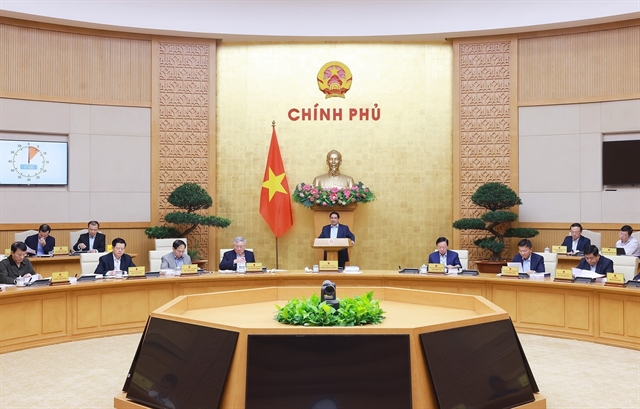 Economy
Economy

 |
| Prime Minister Phạm Minh Chính presides over the monthly government meeting on lawmaking on Sunday. — VNA/VNS Photo Dương Giang |
HÀ NỘI — Institutional obstacles hindering growth must be addressed during the implementation of the Party’s policies, said Prime Minister Phạm Minh Chính as he chaired the monthly government meeting on lawmaking on Sunday.
The Government leader said significant time and efforts have been dedicated to developing and improving the legal and institutional framework, which is considered one of the country's strategic breakthroughs.
Since the beginning of the term, the Government has held 35 thematic sessions on lawmaking. Three of these sessions were held in 2025, reviewing and giving feedback on 18 draft laws, ordinances and resolutions.
Developing and improving the institutional framework is becoming increasingly systematic, professional, innovative, scientific, practical and effective, PM Chính noted, with a focus on streamlining administrative procedures promoting decentralisation and delegation of power, alongside resource allocation, inspection and supervision.
At the meeting, Government officials reviewed and commented on four law projects and two draft resolutions from the National Assembly (NA).
One of the discussion topics was naturalisation and restoration of nationality in the draft amendment to the current Law on Vietnamese Nationality, to make Vietnamese naturalisation more open and convenient.
In the draft amendment to the Penal Code, discussions centred on capital punishment and its execution, monetary penalties for violations, and issues related to high-tech crimes and commercial fraud. Officials also mulled over whether to apply criminal procedures for violations arising from new and experimental sci-tech business models.
Regarding the draft NA resolution on the establishment of regional and international financial centres (IFCs) in Việt Nam, officials commented on special, breakthrough policies to build and develop leading IFCs that operate according to international standards.
They also discussed the operational and management models of these establishments, along with procedures for dispute resolution and mechanisms to attract talent and investment.
Discussing the NA resolution on a pilot scheme for social housing development, Government officials focused on how these regulations promote house ownership for low-income individuals and industrial park workers, and the involvement of labour unions in this process.
Other topics of discussion include the draft amendments to the Law on Organisation of Criminal Investigation Bodies and the Law on Handling Administrative Violations.
Concluding the meeting, PM Chính gave high regard to the work of the Ministry of Public Security, Ministry of Justice, Ministry of Finance, and Ministry of Construction for their proactive and diligent preparation and submission of the draft laws and resolutions, as well as the constructive feedback of government members during the discussions.
He directed the ministries in charge of the law projects and draft resolutions to take into consideration the comments and promptly finalise the legislative dossiers to submit to the NA at its upcoming session next month.
Deputy PMs are required to manage relevant agencies in finalising the draft laws and resolutions within their scope. The principle is to address all institutional obstacles hindering national growth and production capacity, and mobilise all social resources for development.
The decentralisation and delegation of authority should be carried out to the greatest extent possible, accompanied by inspection and supervision mechanisms as well as resource allocation.
In addition to streamlining administrative procedures, authority and regulations to handle administrative violations must be made clear to ensure effective enforcement. — VNS




